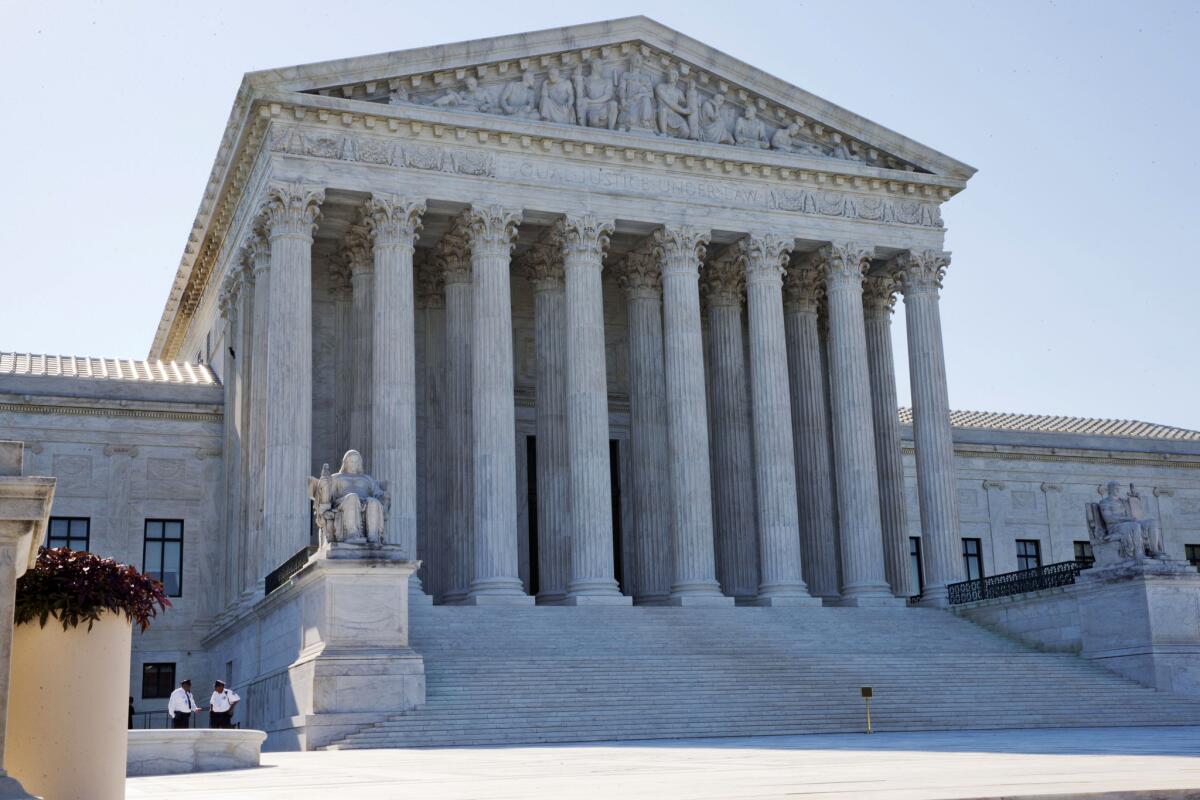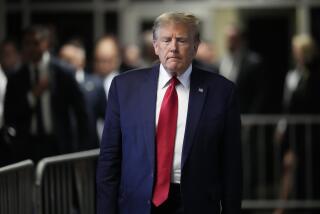Supreme Court to decide whether Trump’s tax returns must be released to House

- Share via
WASHINGTON — The Supreme Court stepped into the midst of a major clash between Congress and President Trump on Friday, saying it will consider three cases in which Trump argues the Constitution gives him sweeping immunity to shield his tax returns and business records from being released to House Democrats or prosecutors.
The court’s action sets the stage for a politically charged decision next year, just as Trump campaigns for reelection.
At issue in two of the cases, involving subpoenas from House committees, is a fundamental question involving the separation of powers: Does Congress have broad power to investigate and demand information from the executive branch, including from the president, or is the chief executive shielded from congressional meddling into his personal affairs? The third case involves a subpoena from New York prosecutors.
Trump has claimed a near-absolute immunity from having to reveal such personal records while he’s president — an assertion that has, so far, been rejected by federal district and appeals court judges in all three cases.
If the justices uphold the subpoenas — two from House committees and one from a New York grand jury — Trump’s tax returns and other financial records could be turned over by the summer. However, if the high court rules for Trump, he could continue his reelection campaign without having to disclose private financial details that most other presidential aspirants have, including the amount and sources of his income, taxes he has paid and business dealings of the Trump Organization.
Lawyers for the House say Congress has a long and honored history of conducting investigations, and they argue that “valid subpoenas” to Trump’s accountants and bankers carry the force of law. They won before federal district judges and the U.S. appeals court in Washington in October and the 2nd U.S. Circuit Court of Appeals in New York this month.
Trump has been confident he would prevail before the Supreme Court because five of the nine justices are Republican appointees.
In the past, however, the court has been united on major questions of presidential power. In 1974, an unanimous court including appointees of President Nixon refused to shield his Watergate tapes. And in 1997, a unanimous court refused to shield President Clinton from responding to a civil suit alleging he sexually harassed an Arkansas state employee.
In their appeals, Trump’s lawyers said the House demands for the president’s personal and business records are unprecedented in their aim and scope. “It is the first time that Congress has subpoenaed personal records of a sitting president,” they told the court. It is also “the first time that Congress has issued a subpoena, under the guise of its legislative powers, to investigate the president for illegal conduct.”
The Constitution does not specifically say Congress has the power of oversight or investigation, but it has been understood that its “legislative powers” include the authority to investigate the workings of the government. Trump’s lawyers insist this general congressional authority does not include investigating “lawbreaking” or “illegal conduct.”
The dispute over the tax subpoenas comes before the court at the same time that House Democrats are moving to impeach Trump and to seek his removal from office. Though the two battles are separate and are operating on different time schedules, the Democrats see a common theme. In both instances, they say the president has refused to cooperate and has blocked their investigations.
Three House committees — on Oversight, Financial Services and Intelligence — sent subpoenas this year to Mazars USA, Trump’s accountants, and to Deutsche Bank and Capital One, which handled financing for the Trump Organization.
The subpoenas seek a massive amount of information, including eight years of Trump’s tax returns. Lawmakers said they were looking into Trump’s potential conflicts of interest and hush-money payments to two women who said they had affairs with Trump as well as allegations that the Trump Organization profited from “money laundering” by Russian oligarchs.
Trump’s lawyers sued in federal court in Washington to block the subpoena from the Oversight Committee, and they sued in New York to block the subpoenas to Deutsche Bank and Capital One from the Financial Services and Intelligence committees. They said the subpoenas were “extraordinary” and “sweeping” in their scope.
In the Deutsche Bank case, they said the committee’s subpoena “demands information about seven business entities, as well as the personal accounts of not only the president, but also Donald Trump Jr., Eric Trump and Ivanka Trump” as well as “all of the named individuals’ immediate families — meaning their spouses and minor children, and in the president’s case, his grandchildren.... They seek documents reaching back more than a decade [and] cover individuals who have never held government office.”
Separately, a New York grand jury at the urging of Manhattan Dist. Atty. Cyrus R. Vance Jr. subpoenaed Trump’s tax returns and financial records as part of an investigation of the hush-money payments to two women. Trump’s lawyers said the president had an “absolute immunity” from a criminal investigation, but they lost before a federal judge and the 2nd Circuit. Last month, Trump’s lawyers asked the Supreme Court to reverse that ruling as well.
So far, the lawyers on both sides have taken broad positions that may not fare well before the justices. The House lawyers have argued that lawmakers have a nearly unlimited authority to demand documents and personal records because they might bear on some future legislation. Trump’s lawyers have contended the chief executive has a nearly absolute shield from being forced to disclose information to Congress.
The famous precedent in this area is the 1974 ruling in United States vs. Nixon, in which the Supreme Court upheld an order requiring Nixon to turn over his Oval Office tapes to the grand jury investigating the Watergate break-in.
Not surprisingly, the competing lawyers see it differently. To lawyers for the House, the Nixon ruling demonstrates the president is not above the law and can be required to disclose even his private conversations in the Oval Office. But Trump’s lawyers point out the subpoena came from a criminal grand jury, not Congress, and it sought information that was crucial to a pending criminal case.
More to Read
Get the L.A. Times Politics newsletter
Deeply reported insights into legislation, politics and policy from Sacramento, Washington and beyond. In your inbox twice per week.
You may occasionally receive promotional content from the Los Angeles Times.











